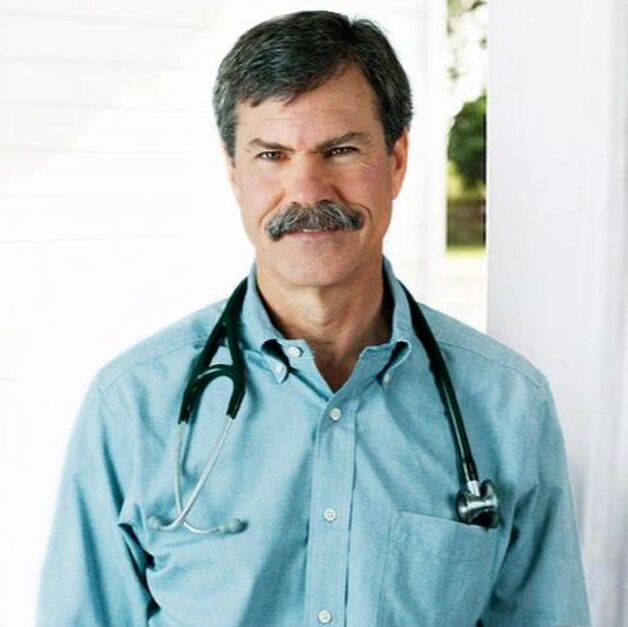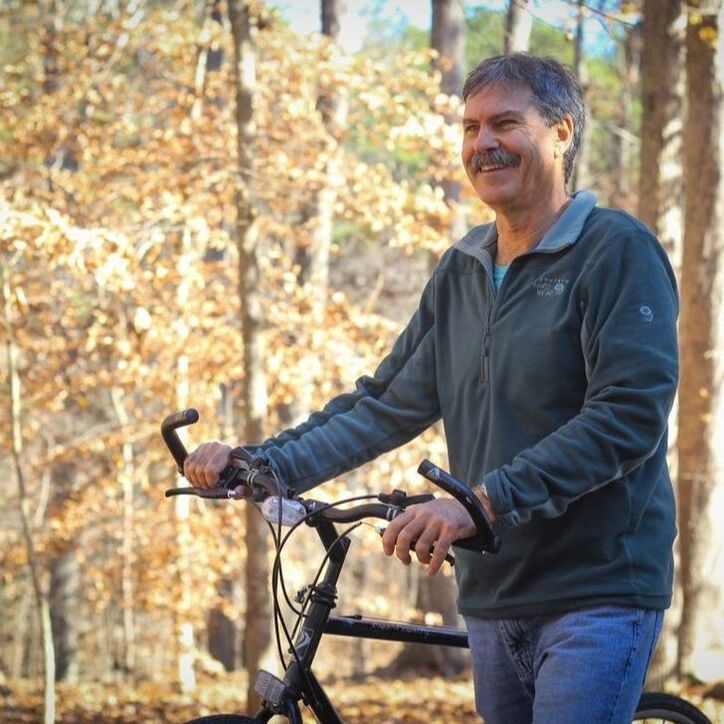|
"This article discusses challenging topics related to complex illness and mental health. Trigger warning for suicide. Northwest Somatics is not affiliated with Vital Plan and does not receive any financial compensation for publishing these links. Publishing this interview does not constitute an endorsement of any treatment protocol or medical advice. Most of the links on this post are informational, but a few are affiliate links to help maintain this website. Dr. Bill Rawls is a well-known friend and advocate in the Lyme community. His book Unlocking Lyme is a step by step guide to treating chronic Lyme disease naturally. In fact, it is how he treated his own Lyme disease. Dr. Rawls created Vital Plan, a supplement company with the goal "to empower people to take control of their health and provide easy access to his potent herbal blends." I had the opportunity to talk to Dr. Rawls on June 2nd, 2020. We spoke on the phone as he was spending quarantine at his home in North Carolina. Our topics included COVID-19, chronic Lyme disease, chronic immune dysfunction, and mental health. In this interview you will learn about the differences between acute infections and chronic infections, the mindset shift that can change your approach to disease, and why we need to be doing more research on the role of microbes in complex and chronic illness. What has life been like for you since the pandemic began? "It hasn’t been a radical change for me personally and in some ways it's actually worked in my favor. For the past couple of years, I've been writing and working for Vital Plan directly—working with product selection and sourcing ingredients, working with the staff. When COVID came along we sent everyone home, but we already were working from home a lot. We were already in the mode of meeting with each other remotely and sharing documents and doing videos remotely, so when COVID came along it was just taking that next step." "I'm an outdoors person and so I continue going out and walking, hiking, biking, and all the things I enjoy doing so much. The things we miss the most are grocery stores and going out to events. I'm one of the more fortunate and I'm grateful for that." "I recognize that a lot of people have been really, really put in a bad position by this thing. It's like anything, when you shift things, some people benefit and some people lose; and think overall a lot of people have been negatively affected. I've been very cognizant of those people and trying to do things behind the scenes and otherwise that might benefit those people." What concerns are you hearing from the chronic Lyme community about COVID-19? "I have a group of people that are on our Restore program that I do a Facebook Live with. I do that normally once every two months and I stepped it up to every week during the COVID crisis to reach out to those people. What I found is, these are people who recognize they have immune system issues, so they were really, really being careful. I never was able to talk to anyone who has had it, because people were being so vigilant and staying home that they weren't getting it." "The issue with this virus is that it's almost not bad enough. I've been following it since the very beginning and the reports that we were hearing out of China was that the recognized mortality is about 2.4%. Compare that to SARS and MERS that were 10% & 50% and Ebola at 60%. It tends to be the more severe the illness something causes, the more recognizable it is and the easier it is to contain. When someone gets Ebola virus, they get sick pretty darn quickly and you don't need a test to know who has Ebola, so you can quarantine those people.” "What I was hearing early on out of China was that 80% of people were not getting sick enough to need hospitalization and 50% of people were only having a mild encounter that wasn't much more than a common cold. What that means is even at that 2.4% mortality, if half the population wasn't even being tested or wasn't sick enough to be tested, then mortality is half of that or less. As they are actually doing antibody testing and recognizing that large portions of people were not sick or did not get severely sick, but contracted the virus. It looks like it's more along the lines of 0.5% mortality, which means that it's really hard to contain." "It almost makes it more dangerous than Ebola virus, because it spreads much easier and most people aren't going to get sick, but just out of the blue some people get really, really sick. That tends to be more the elderly, but there were young people that got really sick, too. Not being able to find out who was going to get really sick and also not knowing who had the thing and didn't--wow that makes it a really, really difficult thing.” "But what tends to happen is the longer something is out there the less virulent it becomes, and already we are hearing reports around the world from scientists who are thinking the virulence, the ability of this thing to cause severe illness, is actually going down pretty rapidly. And this coronavirus doesn't seem to mutate like an influenza, so it may not be something that will come around again and again. In other words, there's a possibility that once most of the population is immune to it, it will go away and we'll never hear from it again. That would be a blessing. We don't know that's going to be true, but I'm optimistic about the whole thing, cautiously optimistic. and of course being careful." Dr. Rawls stressed the ongoing importance of taking coronavirus seriously. "I'm not suggesting complacency at all. We do still need to be careful. I'm still wearing a mask when I go to the grocery store. I think going to social events where we're cramming people together or transportation where we're cramming people together—we've become so complacent about those things anyway. We're living in a time where we are going to see more and more of these kinds of things. I hope that what this does is set a precedent in the future that we're more careful about the fact that humans do a really good job of spreading microbes and we just need to be more careful about how we go about life." In this time in history when we are talking so much about infection, why are we not talking more about chronic Lyme disease? "This thing that we call chronic Lyme disease is not even recognized by the conventional medical community, and these people are ostracized often. There's a pretty high level of not understanding what Lyme disease is not only in the conventional medicine community, but also in people who are struggling with chronic Lyme disease. And that's the thing that I've been trying to combat through writing, through all the things that I do." "It's not just about one microbe. So the conventional medical community has said, well these people get infected, they're treated with antibiotics, it eradicates the microbes, and people that have this chronic thing...it’s not Lyme disease. It’s not the microbes.” "It's really a misunderstanding or not understanding of the difference between an acute infection and a chronic infection. An acute infectious illness, whether it's a tick bite or coronavirus or ebola, you're talking about the first time a new microbe enters the body. The immune system of that person has never been exposed to that microbe before. What happens then is really a test of the immune system of how well it knows that microbe." "When you look at our genes, our genes are basically a database of information, so all the things that our ancient ancestors were exposed to, whether that’s toxic substances or microbes or whatever, are built into our genes. And so when the immune system is exposed to a microbe over and over and over again it learns how to deal with that microbe and over time that becomes recorded in the genes." "It's like our normal flora--we think of them as being our friends—no, they're aggressive like all the other microbes, but we know these microbes, our immune system has been dealing with these microbes for millions of years. It's so well-primed that it can establish a relationship with these microbes that it curtails any potential aggressiveness to the point that we give these microbes priority and they help suppress other bad microbes." "When you look at Ebola virus, humans have never been exposed to that thing, so it's devastating. Coronavirus—there are 3 coronaviruses that circulate in the human population all the time and they cause the common cold. So this coronavirus is a new one, because it came from animals, but it's still not totally new. We have some ability to deal with coronaviruses, so that's why half the people out there are just getting a common cold.” "It depends on what is stored in your genes, what's built into your immune system. Some people have information built in that they are immune to this coronavirus, other people may not as much. And certainly as your immune system ages, then your risk of many of these things goes up." "Our encounter with borrelia--most people have a very mild infection, because humans have been exposed to borrelia and other tick borne microbes for literally hundreds of thousands of years—ticks have been biting humans ever since there have been ticks and ever since there have been humans. So people get a mild initial infection, but it's really, really sneaky and it slides under the radar. Its strategy is not to knock down the door and have a front entry approach like coronavirus, its strategy is to slide underneath the radar and get in and go deep as quickly as possible. So it infects white blood cells, spreads throughout the body, and sets up its presence." . "The microbe wants resources and food. And for borrelia, it wants a platform to be able to spread to other hosts, so it wants to reside in a host, like us or a mouse or other recognized hosts, reproduce in our bodies, use our resources, and just hang out. And then every time you get bitten by a tick it has a new opportunity to spread to yet another host. So, it really doesn't need to make you sick or kill you to do that. It may make you sick, but not deathly ill." "We have a lot of microbes, so it's not just borrelia. We all carry different varieties of pathogens that our immune system keeps a finger on. So if your immune system is strong, you may contract borrelia, and a lot of people do, and don’t get sick. I had probably been carrying it in my system for years, but let your immune system go down, and that's when you start to have problems. And that’s what a chronic infection is. A chronic infection with any microbe occurs because the immune system is in disarray and cannot keep on top of it." "It's like coronavirus people get really sick from it, but then they get over it, the immune system takes care of it. So either the person dies or--most of the time with coronavirus--the immune system wins and after you recover, you go on about life." "When people are sick with chronic Lyme disease, what that implies is immune dysfunction. Part of that is the microbes, but when I talk with people, it's also a perfect storm of other factors that have come together—various kinds of stress, or somebody was in an automobile accident, or in my case doing an obstetrics call every second night for years and years and not sleeping. These stresses finally destroy the immune system to the point that borrelia--but not only borrelia, many other microbes (and this is where the co-infections come in, people have a reactivation of Epstein-Barr and they have mycoplasma, which typically doesn’t come from a tick bite, they get it as a respiratory infection when they are kids, etc.)—all these things add up in the system and then you trash the immune system and these things start to flourish in the tissues." "I've talked to so few people over the years that can say, 'well I got this tick bite and I got antibiotics, and never got well, and I didn't have any stress in my life.' It happens, but I think when that happens it's because people got an overwhelming dose of multiple microbes at one time. Most people probably picked it up as a kid, didn't have that much [of a reaction], but it was all these other things that came together." "But it's pretty low grade, so that's why when they do joint biopsies in chronic Lyme disease they typically don't find microbes, because there are not a lot of microbes in the body. Infectious disease doctors, they are trained to treat acute infections, they don't understand chronic infections. They're trained to treat pneumonia in a compromised, hospitalized patient. They don't understand chronic Lyme disease. But so many people are out with their focus on how do I kill this microbe? And what their focus should be on is how do I suppress this microbe and restore the ability of the immune system to function properly, because that is the only way to do it." As you know, I'm a mental health therapist, and I’m interested in your opinion on treating mental health symptoms associated with tick borne disease (depression, anxiety, "Lyme rage," etc.) Specifically if there are any herbs/supplements that can help reduce symptoms or support emotional health? "I'm a huge advocate, as you probably know, of herbal therapy, because herbal therapy is affecting so many aspects of the illness in so many different ways. There was a study published from Johns Hopkins University where they took several of the more commonly used herbs and they found out they were more effective at suppressing the borrelia than antibiotics are. It was nice to see that side of it, that they actually do work better than antibiotics as far as suppressing the microbe." "I'm not suggesting, eat a better diet, take care of yourself and your immune system will rebound. Your immune system is in a tailspin and the microbes are driving it, and so you really do have to suppress the microbes, but not all microbes in your system are actually pathogens and you have to do it without destroying your flora, so that's why the herbs are so important." "When you look at borrelia the places it hits are skin, joints, heart, and parts of the nervous tissue, so it is affecting inflammation in the nervous system, which basically turns on or activates that fight or flight response. And it affects sleep." "I don't care what you say, if somebody is getting 4 hours of sleep every night, they're going to be angry and irritable, there's just no way around it. There certainly are people out there that are sleeping what they would define as 'normal' and still have mental health symptoms, but I think that the effect that the microbe has on the nervous system, the brain, and sleep really drives a lot of this by activating that fight or flight response and pushing it to the brink." "Then, you take somebody in their 30s, 40s, 50s, or whatever and you go, 'Okay, nobody understands you, the medical establishment isn't helping you, and you've got all these Lyme doctors who want to get every single bit of money that you've ever earned in your life for something that isn't going to work.' It's pretty darn depressing." "I've been there. I can remember there were 3 separate times where I was just laying in the bed in the middle of the night going, 'God I'm ready. I'm done. I don't want to do this anymore.' But somehow that wasn't in the cards for me and I had to keep pushing." National Suicide Prevention Hotline 1.800.273.8255 "The thing that made the most difference for me is making that transition from 'I've got to find somebody that's going to help me,' to, 'I'm going to take care of this thing. I'm going to become proactive. I'm going to become accountable. I'm going to figure out how I can get over this thing. And when I do that I'm going to help other people.' So, it's the concept of having a purpose. I think having purpose is so remarkably powerful to move beyond focusing on the symptoms, which we all tend to do." "For several years, all I could talk about was how miserable I was and how bad my symptoms were. To the point of ‘I've got to figure this thing out, and when I figure this out I'm going to help other people.' So many people that I talk to, move to that point of moving beyond the symptoms to find purpose. Why am I here? How can I serve other people and make my world a better place?" "I always use the example of Stephen Hawking. Here was this guy who was trapped in a body, think about the misery that person endured. But he had so much that he wanted to tell the world that he just kept at it, so his symptoms were not as significant as his purpose. I think that is so remarkable. He moved beyond the symptoms to find purpose in life and the symptoms became less relevant." "Yes, you have to do the herbs, you have to change your diet, you have to do all the things that are important for recovery, but if you do it with the idea that, 'I'm not going to let these symptoms rule my life. I’m going to move to a point where I can be significant, no matter what state I'm in.' That's the point where you see people actually moving toward recovery." "It's important to recognize symptoms of anxiety and depression and look at them from the point of view of what's causing it--neurological inflammation, sleeping 6 hours a night, etc. But moving people beyond the symptoms and not just dwelling on the symptoms. 'How can I help you find purpose to move forward beyond this thing that is dominating your life?' We all have symptoms. We're all on this planet for only a defined period of time. What we do in that time is more important than anything else." "As far as helping people out symptomatically, I like natural therapies better. Top of my list would be ashwagandha, a wonderful adaptogen that can really help recovery. There are calming herbs, like passion flower. CBD oil is good at helping symptoms. The problem with CBD oil is getting good quality and the cost of it. As the cost comes down and it's more available, I think [CBD] helps a lot with the symptoms of anxiety, depression, sleep, pain, so that's on the top of my list." "It's really important to recognize that when we're talking about chronic Lyme disease, we're specifically talking about someone who has been found or is suspicious that they are carrying one of the species of borrelia that causes Lyme disease. We are becoming aware of all these different co-infections. I don't look at Lyme disease in the same way as a lot of people. Fundamentally, I think chronic fatigue, Lyme disease, fibromyalgia are all the same thing. I think basically these things are on the pathway to other illnesses, like multiple sclerosis, Parkinsons, and others. The central feature to all of those things is chronic immune dysfunction. I'm not suggesting that everyone with chronic fatigue and fibromyalgia and ms and everything else have borrelia. What I'm suggesting is that we all contract microbes throughout our lifetime, specifically intracellular microbes, that live inside cells. I sat down with people with people to define over 100 species of microbes that were intercellular, stealth-like, and could be present without causing illness, but could cause chronic infections like Lyme disease if the immune system went down. There are certainly people with chronic fatigue and fibromyalgia, who have all the symptoms of Lyme disease, but don't have borrelia, so they've got chronic immune dysfunction with other microbes being active." "Do you think the average healthy person has microbes in their brain? There were multiple studies, one in 2016 and one in 2017, they were looking at Alzheimers in one and multiple sclerosis the other, but they had controls that were people who hadn't passed away of a neurological illness. What they discovered was that every single example, whether it was a diseased brain with a neurological illness or a control brain, had hundreds of species of microbes. So we actually have a microbiome of the brain. What was interesting is that people with Alzheimer’s and multiple sclerosis had the shift toward pro-inflammatory microbes or microbes that are more apt to cause illness and more problems with intracellular microbes, so this idea that has been going on so long that our microbiome is limited to our gut and skin is false. We have microbes throughout our body, we have microbes throughout our tissues, we have microbes in our brain and our heart." "Most physicians aren't aware of this. Most physicians say we don't have microbes in our brain. Physicians are the last people to get it. They're too smart, they know for sure about what they've been trained and they know it's right." "So much of what we know is proven wrong." Why isn't the impact of microbes on our health and mental health studied more in Western medicine? "It's because of a phenomenon called reductionist science. There's a lot of research done around the world. People are looking at one little thing. I like to think about it as a jigsaw puzzle. When you look at my book, Unlocking Lyme, it's not one puzzle piece that I'm making conclusions from, it's hundreds and hundreds of bits of information that I put together to create a picture of how things might be." "So what you've got worldwide is nobody in the scientific world is doing that, they're trying to look at single puzzle pieces and trying to make conclusions from it, and it's always going to be wrong. They just have a really hard time putting those big concepts together and it's because we've lost the logic in science." "Scientific method is based on forming a theory and then doing the science to prove that theory, so what you've got out there, because our science is mostly driven by creating new drugs, we're not using good scientific method, especially in medical science. How do I figure out this little pathway and there's no big picture theory about why we should be looking at that, or the theories we're using are too short-sighted. We need more people to do what I do and create the big pictures so that you can start getting an idea of what's going on before you get all the pieces on the puzzle. Scientists, especially medical scientists, they absolutely refuse to make conclusions until they see everything." "When you look at autoimmune disease, here you've got a much expanded microbiome and we look and go what do these microbes want? Well, they want to manipulate us for our resources. This concept of intracellular microbes, that's been going on since the very earliest time on Earth. For 3 billion years all there were were microbes or bacteria. Everything has to have food, so early on some bacteria started infecting and pirating bigger cells to take over those resources. Sometimes it worked out to be useful. Our mitochondria are ancient rickettsia species." "Intracellular microbes have been there since long before we have been there. These intracellular microbes, what they want to do is they want to pirate resources from that cell, so to do that they've got to keep the immune system from destroying that cell. All the intracellular microcrobes—borrelia, mycoplasma, rickettsia, all of them—the first thing they do is infect white blood cells, that way they can hitch a ride to be spread throughout the body and it also gives them the ability to influence the immune system, to basically make that white blood cell send out erroneous messages." "I like to think of it as an analogy: It's like our body has pathogens, well a big city like New York or Chicago has criminals. You will never eradicate all the criminals in New York or Chicago. They will always be there, no matter how big your police force is. But it would be like there was a group of criminals that specialized in hijacking police cars so they could get to the radio and send back bad messages to central dispatch that sent all the police cars to the other side of town from where the crime was going on. Intracellular microbes infect the white blood cells and send out bad messages called cytokines. It depresses the ability of the immune system to take out cells that have been infected by microbes." "But here's the deal, so they take the pressure off so these things can get established and spread throughout the body and they infect different cells. Borellia likes things with cartilage, so it's hitting the joints, brain, and skin. bartonella and babesia, like red blood cells. Rickettsia likes lining the blood vessels. But they're all infecting different kinds of cell bodies. Initially, the immune system is thrown off guard, but it's not giving up, it comes back so that the secondary immune system comes in and creates antibodies and labels these cells as being abnormal, but it doesn't just label the cells that are infected it labels the normal cells, too. So I can't help but think that's what an autoimmune response is. If you read the literature, virtually everybody with chronic symptoms of Lyme disease has this autoimmune phenomenon. Proving it is hard, because the living model is so complex, it's hard to find it, but logically why can't you go there with a high level of suspicion?" "Right now 20% of cancers are associated with intracellular microbes, and that's probably low. I wouldn't be surprised if there were many, many more, or possibly even all cancers are going to be associated with microbes sooner or later. I think we're going to find that all of the chronic illnesses, autoimmune illnesses, Parkinson's, Alzheimer's, all of them, are associated with chronic immune dysfunction and this thing where these intracellular microbes and pathogens start to flourish in peoples' systems and make them chronically ill, because there are so many pathogens, different ways the system is disruptive, and different genetics, people get different illnesses." "As we move forward [Lyme disease] is going to be with us more, because our world is being affected in such an adverse way. People are caught up in their own problems and they’re not recognizing that the way that we’re changing the world, especially over the past 50 years, is really affecting all of us in a very bad way." "When billions of people around the world are driving cars and they’re all putting out fumes. It's not only causing global warming, it's also putting out fumes that are affecting everybody. So we're truly living in chronic immune dysfunction and we have to wake up and start recognizing this." "It's bigger than Lyme disease. We need to move into a bigger conversation that's everybody's having. Working toward ways that we can all have quality of life, but we're willing to take some cuts here and there. As a culture the more that we're willing to move toward making decisions, not only protecting ourselves, but our environment as a whole, that's where we need to begin." "I think we're seeing a rise in autoimmune disease, chronic fatigue, chronic Lyme disease, and all these other chronic illnesses, because of the impact that we're having on our immune system from how we go about life--toxins we're exposed to, the foods that we're eating. And these are all things where we have a choice." "It's not too late, it's up to your generation to start making huge decisions." What are you hopeful about right now related to chronic Lyme? Where do you find the hope? "I find the hope in that the more people that are like you, that are talking about this is the way that we are going to solve it." "There is a lot of turmoil right now. The big thing that we have right now is the ability to convey information better than ever before. The ability of people with chronic Lyme disease to organize and influence what is being said." "What I'm gradually seeing is many of these doctors are starting to use herbal therapies or being more reasonable in the therapies they're offering. The Lyme doctors are gradually becoming more educated and becoming more open-minded. The more that the chronic Lyme community is talking and moving beyond symptoms. Not focusing on the symptoms, but going, 'How do we solve this problem and how do we unify to solve this problem to help the most people? How can we move beyond symptoms to purpose?'" "I’m very optimistic that is happening." A big thank you to Dr. Rawls for taking the time to talk to Northwest Somatics. The Lyme community is very grateful for you. You can read my review of Unlocking Lyme from 2017 here. "We must be willing to let go of the life we planned to have the life that is waiting for us." - Unknown
1 Comment
STACEY BELLIS
8/29/2020 12:29:10 am
I was diagnosed with multiple sclerosis 1 month after I turned 50. My grandma is 96 and had it since she was in her 20s. I have been on WORLD HERBS CLINIC MS HERBAL FORMULA (w ww worldherbsclinic co m), the first TWO MONTHS was daily and now I am on 3 times a week. It has made a tremendous difference for me. The fatigue never gets to me again. When I do too much, I don’t feel weak anymore..
Reply
Leave a Reply. |
WelcomeI'm Kerry (She/Her/Hers) and I am a licensed therapist, group facilitator, poet, writer, & speaker. This is a place to acknowledge and validate our suffering and trauma, while also learning how to turn toward aliveness and spaciousness. Categories
All
Archives
April 2024
|
|
Copyright © 2024 Kerry J Heckman All rights reserved. Disclaimer.
|
|






 RSS Feed
RSS Feed